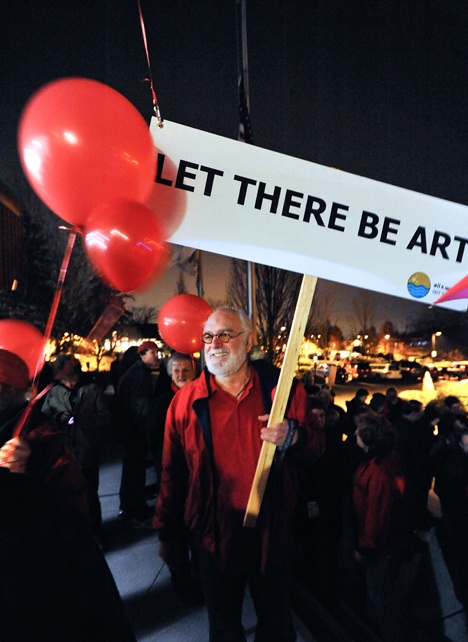Hoisted above a wave of red jackets, scarves and hats, Richard Nelson’s white cardboard sign, decorated by red balloons, portrayed the message more than 150 supporters of the arts gathered on the steps of City Hall to deliver.
“Let there be arts,” the sign read.
“I believe art has real power,” he said. “We can’t let a little lack of money unplug the power.”
Nelson, the owner of Oil and Water Supply on Bainbridge, joined other citizens, families and members of the arts community who flooded the Council Chambers and filled City Hall Monday night. They were there to persuade the City Council to increase funding to the Bainbridge Island Arts and Humanities Council, an organization that distributes money to art institutions on Bainbridge Island.
Several individuals spoke in favor of the arts, imploring the council to recognize the value of culture on Bainbridge.
“The arts are a very susceptible target for budget cuts, but it really is the heart of our society,” Bainbridge High School senior Tavis Hamilton told the council.
The council didn’t discuss the issue of arts funding at the Monday meeting, but instead voted to leave the issue open while Interim City Manager Lee Walton searches the general fund for possible sources of cash.
Walton previously spoke of how the time has come for the council to decide how much it can actually afford to support the arts.
“I’m concerned that we can’t continue to do that and still maintain a respectable level of essential services,” he said previously. “I think it will be a big test for the city over the next year or two to solve that problem.”
The council had originally budgeted $323,000 for BIAHC in 2010, but budget talks this fall led to a reduction in funding to $136,000 – the level of money received in 2009. Since then members of the arts community have lobbied the council to obtain more funding, with a goal of increasing it to $259,000 – a number BIAHC believes will allow the structure to remain intact.
“These are economic development dollars,” said Morgan Smith, executive director of BIAHC. “On Bainbridge Island, the arts are a tremendous source of money. It’s actually one of the few places where the city can get money back.”
The red sea of supporters agreed.
“Whether or not the individual artists benefit, it’s great for the community,” said Gayle Bard, a member of the Design Review Board, who carried with her a bright red umbrella to shield her from the elements.
Councilors and city officials have recently wondered whether or not the city can continue to fund the arts. With numerous services remaining underfunded, the city
Rumblings of a gathering at the Monday council meetings sprang up Friday, but a groundswell of support organized virally, by way of Twitter, Facebook, newsletters and emails, led to a packed house of art supporters and artists.
Susan Jackson, executive director of Bainbridge Arts and Crafts, was a primary organizer of the gathering. She used a number of means to get the island’s arts community mobilized.
“The Internet is a fabulous tool,” she said. “I can safely say that thousands of people on Bainbridge have received it.”
The throng of arts supporters at the council meeting Monday were not there to save BIAHC, but to ensure it has necessary city money to dole out to local art organizations. BIAHC is not affected by the funding changes, Smith said; it has its own budget.
But as funding for BIAHC has dwindled in the last few years, so has the support individual businesses receive from the city.
The Bainbridge Island Historical Museum received $59,000 in 2004, but last year it was only awarded $15,000, said Executive Director Hank Helm. Salaries had to be cut by 30 percent, he said, adding that the council is ignoring the mandate it created in the Comprehensive Plan to fund the “cultural element.”
“They’re trying to gut the comp plan,” he said.
Increased funding would allow the museum to fundraise less than it has and return to dedicating the majority of time to exhibits and events.
Smith understands that the economy has impacted everything the city funds, but no group has taken a bigger hit than the arts community.
“There is no other function or department that has seen this level of impact,” Smith said. “It’s not the economy, it’s a policy choice.”
Council Mayor Chris Snow said the budget for the arts dropped from nearly four times its current level in only three or four years.
“The total budget for arts and humanities programs reached up to nearly half a million dollars, and then the economic decline set in in 2008 and 2009, and we found that we didn’t have enough money to pay for everything we needed to pay for.”
As the economy continued its downward spiral, the city had to layoff staff and force unpaid furloughs on those that remained. At that point, Snow said, the council had to put the microscope on everything it funded.
Recent talk at the city has focused on getting back to maintaining essential public services like roads and police. But as Nelson, the owner of Oil and Water Company, said, there is no more essential a service than the ability to express oneself through art.
“Bainbridge Island is an art island,” he said. “And it’s up to our city officials to recognize that.”


